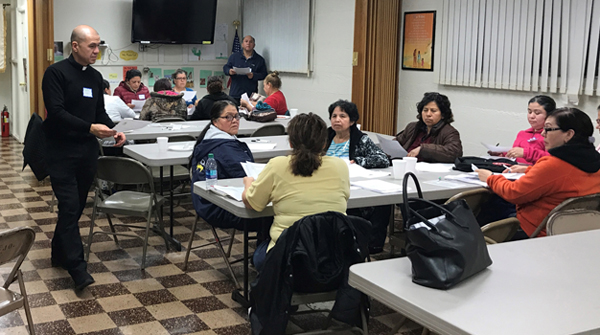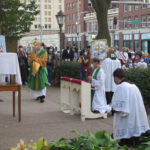
Father Joseph Sia, left, facilitates a Vision 20/20 listening session Nov. 6 at St. Joseph Parish in Columbus Junction. Also shown, in back, is Miguel Moreno, diocesan coordinator of Multicultural Ministry.
By Barb Arland-Fye
The Catholic Messenger
Iowa City — Many Catholics struggle with the term “evangelization.” They wonder what it means in the practice of their faith and whether they are adequately equipped to “go out and evangelize.” These observations surfaced during a Vision 20/20 listening session of the Diocesan Pastoral Council (DPC), which met Nov. 10 at St. Patrick Parish in Iowa City.
Vision 20/20 is an initiative to revitalize the faith of Catholics in the Davenport Diocese and to inspire a fresh encounter with Jesus Christ and his church through the grace of the Holy Spirit. Bishop Thomas Zinkula asked for the DPC’s input from parish-based listening sessions held this fall.
Mike Panther, who represents parishes in Lee County, said people in listening sessions he facilitated felt that they weren’t adequately trained or didn’t have the knowledge to evangelize. They’d like to see more opportunities to learn.
“They were trying to figure out, ‘How do we do this?’” said Carol Kaalberg, who represents seven parishes south of Iowa City. She said Pope Francis’ apostolic exhortation, “The Joy of the Gospel,” which served as a guide for discussion, “was very helpful.” Going out among the people, as Pope Francis encourages Catholics to do, does bring joy, she added.
“Reading ‘The Joy of the Gospel’ was one thing. Talking about it brought it alive,” said Father Rich Adam, an ex-officio DPC member and pastor of Sacred Heart Cathedral in Davenport. During a listening session at his parish, people brought up a concern about “not knowing the faith and thinking that it is not politically correct to go out and talk about our faith.”
People need to overcome the obstacle that exists between living their faith and going out and sharing it with others, Fr. Adam said. He and several other DPC members also shared parishioners’ desire for a renewed focus on the Eucharist. Perhaps homilists “could go more in depth about the Mass,” suggested Roseanne Wisor, who represents six parishes in Clinton County and one in Jones County.
After listening to DPC members’ reports, Bishop Zinkula said parishes will choose teams ready to help shape the future, beginning with regional listening sessions this winter. “Those teams are going to be the ones who are leading the efforts in the parish.” The regional sessions will funnel information collected from the parish sessions. “We need to be starting to talk early next year about what we want to do and what the diocese can do to help support it.”
DPC listening session
Deacon David Montgomery, diocesan chief of staff, led DPC members through a condensed Vision 20/20 listening session, asking them to respond to two questions:
• What are the greatest challenges to evangelization in the Diocese of Davenport?
• To what extent does the diocese reach out to those on the “margins,” e.g. to those who are poor, sick, elderly, those of cultural diversity or those who might feel disenfranchised?
Among the challenges to evangelization: “People are intimidated about being open with their faith,” said Sharon Crall, who serves parishes in Monroe County. Other challenges to evangelization include the clergy sexual abuse crisis, apathy and lack of reverence for the Eucharist, she said.
People are bombarded with information; the Eucharist gets lost in that, said T Waldmann-Williams, who serves parishes in Marion and Mahaska counties. People want to know the characteristics of evangelization. “How do we do it in a more inviting way; how is the Eucharist translated into evangelization?” Learning about best practices in other churches and communities would also be helpful.
“We’re all a part of the diocese; we reach out through food pantries, ministry to the sick, to senior citizens and through Thanksgiving meals and assistance meals and we do it with other churches,” said Lu Ann Farrell. But a sense of disenfranchisement exists. When a Catholic Church closed, another church picked up the baton and welcomed members who lost their church home. “That’s a lesson for us. We need to be more welcoming,” Farrell said.
She pointed out that The Catholic Messenger does a great job in sharing what other parishes and the bishop are doing. Bishop Zinkula’s participation on RAGBRAI (the Register’s Annual Great Bicycle Ride Across Iowa) this past summer was a perfect way to evangelize because he celebrated Mass at each overnight stop. His visits to correctional facilities are another example of evangelization in action. “I now say a prayer for prisoners every night,” Farrell said.
Those examples led her small group discussion toward the Spiritual and Corporal Works of Mercy. “We need to bring back that kind of thing,” she said.
New leadership
The DPC also elected new leaders: Carol Kaalberg, chair; Roseanne Wisor, vice chair; and Sharon Crall, secretary. Outgoing chair Ken Miller thanked outgoing secretary Dianne Lannan for excellent service.
Recap on abuse policies
Bishop Zinkula wrapped up the DPC meeting with a recap on what led to renewed examination of clergy sexual abuse committed long ago. A grand jury report released in August regarding clergy sexual abuse in six Pennsylvania dioceses included criticism of bishops who were culpable or did not adequately deal with offenders and their victims.
“We’re in a different place than a lot of dioceses,” Bishop Zinkula said. The diocese’s bankruptcy a decade ago led to measures to ensure protection of children and vulnerable adults and that emphasize transparency by listing on the diocesan website the names of clergy with credible accusations of abuse. None are in active ministry today and many are deceased, he pointed out.
Bishop Zinkula also said this week’s meeting of the U.S. Conference of Catholic Bishops would address bishops’ accountability concerning clergy sexual abuse. “What are you hearing out there?” the bishop asked DPC members.
“Let’s get it all on the table and move on,” said Mary Bright Hingst. “I think it’s a healthy thing that there is going to be this discussion. I’ve heard from others about why they don’t come to church – because of the abuse situation,” Waldmann-Williams said.
One DPC member, whose daughter was abused, but not by a clergy member, requested changes in the mandatory safe environment training program. She said the existing program makes victims of abuse and their families feel as if they are being re-victimized again.
“Has the Review Board ever talked about that?” Bishop Zinkula asked Clarence Darrow, who serves on the Review Board. That issue had not come up. “We can certainly take it back to the Review Board, Deacon Montgomery said. “Get families involved … so you are sensitive to their feelings,” the DPC member said. “It’s good you brought it up; it helps us,” Darrow said.











